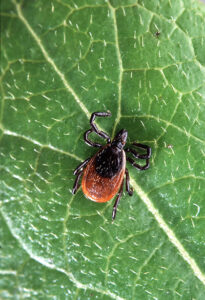The talk will be held virtually via Zoom and in-person at 107 Norman Smith Hall, UMaine. A Career Q&A for graduate and undergraduate students will follow the talk.
- Virtual attendance: Complete the registration form to receive Zoom connection information.
- In-person attendance: Attendees must follow UMaine’s COVID-19 guidelines.

Speaker: Allison (Allie) Gardner, Assistant Professor, School of Biology and Ecology, UMaine
Due to a combination of climate change and an expanding human-wildlife interface accompanying land development, Maine has seen a five-fold increase in Lyme disease incidence over the past decade. Active forest management may alter individual risk of exposure to tick-borne disease and the spread and persistence of tick-borne disease in the forest landscape via diverse mechanistic pathways. In southern Maine, over 80 percent of forested land is managed and used for hunting, timber extraction, and outdoor recreation by non-industrial family forest landowners, creating both an urgent public health need and a unique socio-ecological context in which to investigate the effects of forest management on disease transmission.
In 2018, Gardner, Jessica Leahy (SFR), Carly Sponarski (WFCB), and Laura Kenefic (USFS) launched the Maine Forest Tick Survey, a cross-disciplinary research project with the long-term goal of identifying forest management practices that inhibit tick-borne disease transmission, are compatible with landowners’ economic interests, while conserving biodiversity and enhancing other ecosystem services provided by healthy forests. The natural science component of this project, conducted in cooperation with the Maine Woodland Owners Land Trust, investigates the cascading impacts of silviculture treatments on wildlife communities, small mammal behavior and tick encounter frequencies, off-host tick survival, and entomological risk of exposure to tick-borne pathogens. The parallel social science theme of the project investigates factors that determine management decisions by landowners, and whether increased knowledge of the environmental context of Lyme disease transmission (via outreach efforts and participation in a community science program) may motivate private landowners to engage in practices that benefit the health and sustainability of the entire forest ecosystem. The results of this social-ecological research coupled with stakeholder engagement are anticipated to inform practical recommendations to protect rural community health while sustaining a robust forest product supply chain.
Dr. Allison (Allie) Gardner is an Assistant Professor of medical entomology in the School of Biology and Ecology at the University of Maine. Her scientific research seeks to investigate the basic biology of arthropod disease vectors, analyze the interacting social and ecological conditions that enhance vector-borne disease transmission, and explain and predict the spread of emerging tick-borne and mosquito-borne diseases. Ultimately, her goal is to translate her findings into the development of effective and sustainable vector-borne disease management strategies that are grounded in ecological theory. Gardner has diverse experience engaging in research, teaching, and outreach collaborations with interdisciplinary teams of academic researchers in biophysical, quantitative, and social sciences, public health professionals, and government and non-profit stakeholder groups to bridge the gap between her basic research on the biology of disease vectors and application of these results in public health settings. She also is interested in the intersection of science and policy and has served as an Entomological Society of America Science Policy Fellow and a National Park Service Second Century Stewardship Fellow. At the University of Maine, Gardner is a faculty affiliate of the Maine Center for the Genetics in the Environment, the Senator George J. Mitchell Center for Sustainability Solutions, and the Graduate School of Biomedical Science and Engineering. She received a B.A. from Williams College and M.S. degrees in Veterinary Pathobiology and Statistics and a Ph.D. in Entomology from the University of Illinois at Urbana-Champaign.

